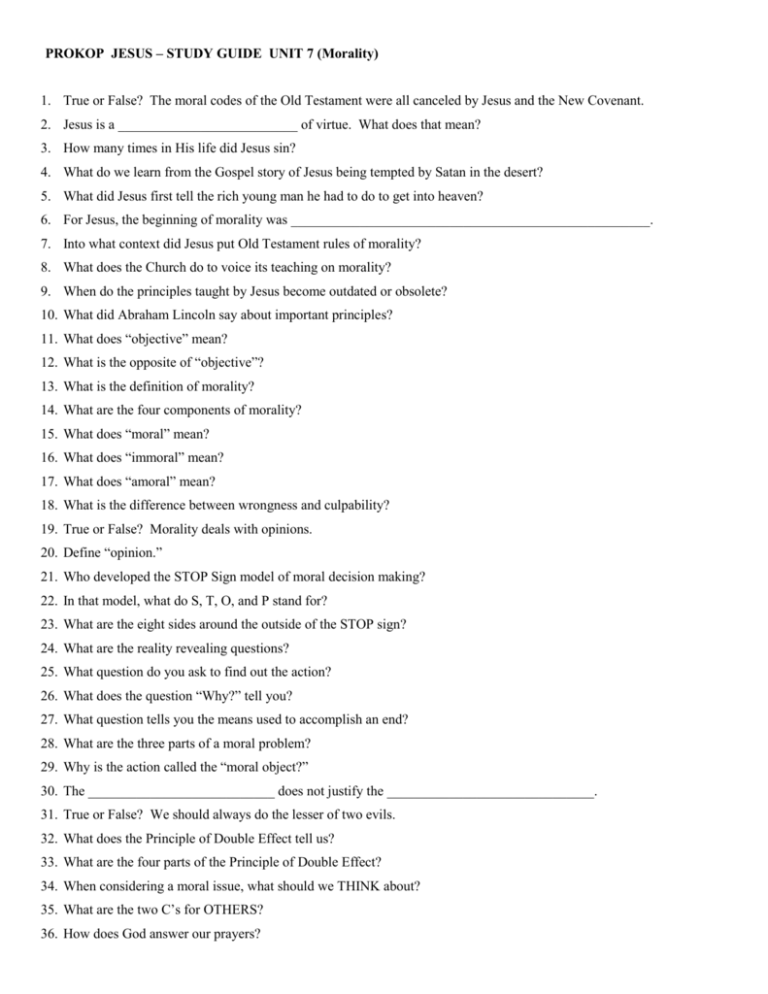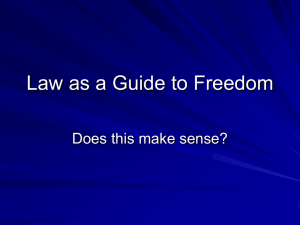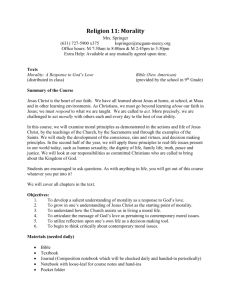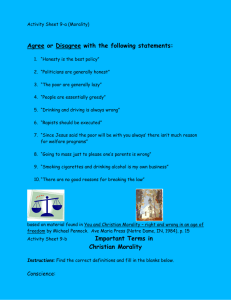Prokop Theology I: The Revelation of Jesus Christ in Scripture (Core I)
advertisement

PROKOP JESUS – STUDY GUIDE UNIT 7 (Morality) 1. True or False? The moral codes of the Old Testament were all canceled by Jesus and the New Covenant. 2. Jesus is a __________________________ of virtue. What does that mean? 3. How many times in His life did Jesus sin? 4. What do we learn from the Gospel story of Jesus being tempted by Satan in the desert? 5. What did Jesus first tell the rich young man he had to do to get into heaven? 6. For Jesus, the beginning of morality was ____________________________________________________. 7. Into what context did Jesus put Old Testament rules of morality? 8. What does the Church do to voice its teaching on morality? 9. When do the principles taught by Jesus become outdated or obsolete? 10. What did Abraham Lincoln say about important principles? 11. What does “objective” mean? 12. What is the opposite of “objective”? 13. What is the definition of morality? 14. What are the four components of morality? 15. What does “moral” mean? 16. What does “immoral” mean? 17. What does “amoral” mean? 18. What is the difference between wrongness and culpability? 19. True or False? Morality deals with opinions. 20. Define “opinion.” 21. Who developed the STOP Sign model of moral decision making? 22. In that model, what do S, T, O, and P stand for? 23. What are the eight sides around the outside of the STOP sign? 24. What are the reality revealing questions? 25. What question do you ask to find out the action? 26. What does the question “Why?” tell you? 27. What question tells you the means used to accomplish an end? 28. What are the three parts of a moral problem? 29. Why is the action called the “moral object?” 30. The ___________________________ does not justify the ______________________________. 31. True or False? We should always do the lesser of two evils. 32. What does the Principle of Double Effect tell us? 33. What are the four parts of the Principle of Double Effect? 34. When considering a moral issue, what should we THINK about? 35. What are the two C’s for OTHERS? 36. How does God answer our prayers? 37. What is the heart of Christian morality? 38. According to John 18:37, why did Jesus come into the world? 39. What two questions will help us to know whether something is OK with Jesus? 40. What does love mean for Jesus? 41. What are the two ways human beings can acquire information? 42. What is revelation? 43. Who said “Genius is 1% inspiration and 99% perspiration”? 44. How does imagination help us make good moral decisions? 45. What is the difference between freedom and license? 46. What are the four qualities of a good law? 47. Who defined these four qualities? 48. What are the four different types of law? 49. How are natural and civil law related? 50. How are divine and Church law related? 51. What is the Church? 52. What is the purpose of the hierarchy of the Church? 53. How do you determine if something is of value? 54. What are the four steps necessary for using values when they conflict in a moral situation? 55. What is moral instinct? 56. What is the bottom line in making a moral decision? 57. What is conscience? 58. For your conscience to work, it must be __________________________________________. 59. What is morality aimed at? 60. Out of what two components did God make humans in Genesis 2? 61. Who said, “You have made us for yourself, O Lord; and our hearts are restless until they rest in you.” 62. What four things identify what is significant about being human? 63. True happiness can only come from __________________________________________. 64. How is conforming to God’s will not surrendering our freedom? 65. Happiness comes only if we want what we ____________________________________________. 66. When we pursue sinful things, we become ___________________________________ of sin. 67. “There can be no __________________________________ apart from, or in opposition to the truth.” 68. Who said that? 69. Virtues help us to focus on what we _________________________________ want. 70. What are the Theological Virtues? 71. Where do they come from? 72. What are the Cardinal Virtues? 73. How do they function?









